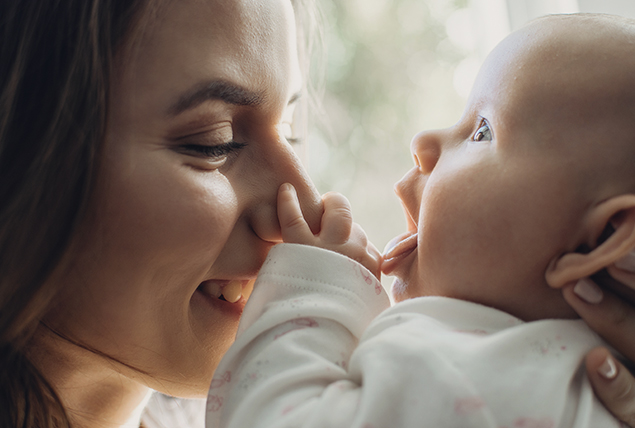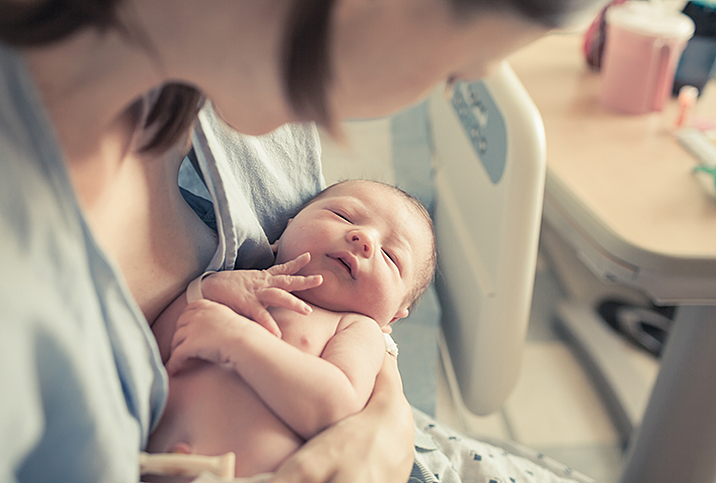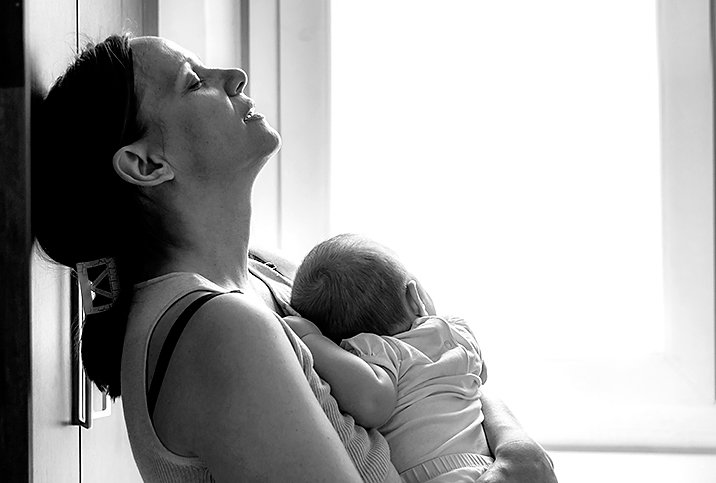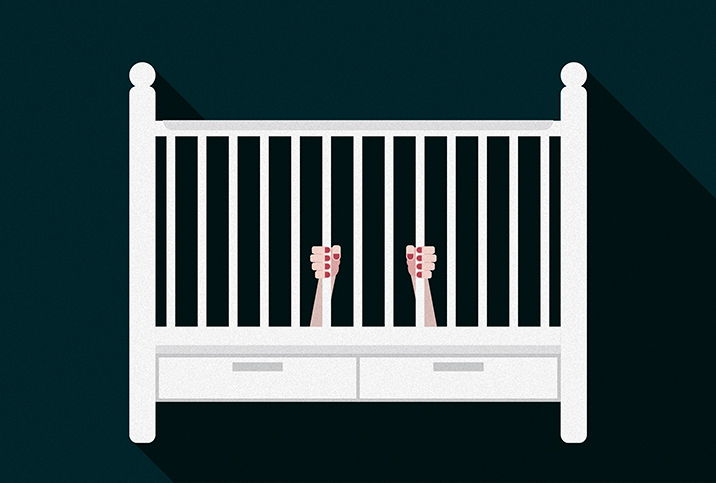Maternal Mental Health: The Unspoken Crisis Damaging Postpartum Care

Key Points
- Being a new mother can carry with it intense pressure and a burden to be that stereotypical happy, healthy new mom.
- In reality, the subject of maternal mental health is complicated and full of stigma.
- It's time mental health care for new moms is brought to the forefront, talked about, and dealt with caringly and compassionately.
Are you struggling with the baby blues, postpartum depression or something else entirely? Maternal mental health care is full of stigma, intense pressure placed on mothers to meet seemingly impossible expectations and significant gaps in care.
In the United States—where maternity leave is not guaranteed—new mothers may feel overwhelmed managing the postpartum period without comprehensive healthcare.
If you're struggling with self-care as a new mom, find out why, where and how to get help.
What factors contribute to poor mental health in new mothers?
Once a baby is born, the focus shifts to the welfare of the child, meaning new moms' needs drop down the priority list. This approach neglects the impact of new parenthood on birthing parents, leaving mental health disorders such as postpartum psychosis untreated or undiagnosed.
In the "fourth trimester," the period after they have an infant, mothers face many obstacles that can contribute to poor mental health. Exacerbating factors may include the following:
- Stressful life events during, before or after pregnancy and postpartum
- A difficult or traumatizing birth
- Poor social and economic conditions
- A history of substance abuse, depression or mental illness
- Financial stress
- Relational stress or dysfunction
- Social isolation
- Facing new parenthood as a single parent
- Breastfeeding difficulties
Is it common for new mothers to struggle a little after childbirth?
Mental illness is the most common complication of pregnancy, according to the National Alliance on Mental Illness (NAMI). Yet, mothers with mental health conditions are sometimes left feeling alone.
"Mental health conditions, especially depression and anxiety, are the most commonly unrecognized complication of childbirth," said Margaret Howard, Ph.D., a clinical psychologist and researcher at Brown University in Providence, Rhode Island, and medical advisor for Flo Health.
"This is not to be confused with the baby blues. Having the baby blues is characterized by no more than two weeks of tearfulness, anxiety, emotional sensitivity and mood swings."
About 10 percent of pregnant women and 13 percent of women who have just given birth develop a mental disorder, according to the World Health Organization (WHO).
More than 1 in 3 women of color will experience postpartum depression, a 2020 report indicated.
Maternal suicide is the leading cause of pregnancy-related death in the year after pregnancy. Nearly 25 percent of women's deaths during pregnancy or up to a year after birth were directly related to mental health issues, according to the Maternal Mental Health Leadership Alliance (MMHLA).
Recommended
- How to Prioritize Self-Care as a New Mom: Your baby needs a lot of attention, but you deserve attention, too.
- The Fine Line Between Motherhood Woes and Postpartum Depression: It's normal to feel down sometimes when caring for a newborn. But at what point is it dangerous?
- Let's Not Forget to Talk About Postpartum Anxiety: You may have more than just the common new-parent jitters.
What should a new mom do if she feels overwhelmed?
"Make your OB-GYN knowledgeable of your family history, particularly if anxiety, depression or other mental illness are present," said Sameena Rahman, M.D., a Chicago-based OB-GYN and the founder of the Center for Gynecology and Cosmetics. "Additionally, if you have a history of it and have not gotten treatment, it's imperative that you are treated during pregnancy to prevent adverse impact after pregnancy."
Conditions such as postpartum anxiety are common. You are not alone. Silence is a killer. Tell a friend, a family member, your partner or a doctor. Speak up. If verbalizing it is too much, write it down and share it instead.
Do not hesitate. Seek care as soon as possible to lower your chances of developing a long-term mental health condition. Remember that Black women are less likely to receive care for postpartum depression, so recruit loved ones to help advocate for your needs.
How do you know if you have postpartum depression?
"Post-natal depression is classed as anything affecting us following the first year of birth," said U.K.-based psychotherapist Zayna Brookhouse, C.H.P. "You may experience obsessions and compulsions you didn't previously to a greater degree, causing you to be continuously anxious."
The condition is sometimes mixed up with the baby blues or dismissed as stress caused by exhaustion. If something doesn't feel right, trust your instincts and dig deeper.
"If a woman has a history of postpartum depression, that increases her risk of experiencing it again, so it's smart to have a mental health team in place, which may include therapy and/or medication," Howard said. "It's important to manage expectations, too, as each birthing experience is unique."
What are the symptoms of postpartum depression?
Figuring out how to help a new mom with postpartum depression can be confusing, but the first step is identifying the signs. Postpartum depression symptoms may include the following:
- Depressed mood for some or all of the day
- Fatigue, low energy and sleep disturbances
- Anhedonia, or lack of joy or pleasure for anything
- Feelings of worthlessness or inappropriate guilt
- Continuous agitation
- Decrease or increase in appetite
- Recurrent suicidal or homicidal thoughts
- An inability to relax
- Social withdrawal or fear of being alone
- Intense anxiety about the well-being of the baby
- Excessive worrying and intrusive thoughts
- Finding it difficult to look after yourself and your baby
- Dissociation and depersonalization, or feeling as if you are in a dream
- You aren't your usual self
- Replaying events, flashbacks or ruminating
Untreated postpartum depression is dangerous for the mother and the child. If you suspect you have this condition, reach out to a doctor as soon as possible. When struggling to manage postpartum depression, check in with your physician to explore treatment options.
Why don't new moms speak up when they need mental health help?
"The stigma around postpartum depression is profound," Rahman said. "Social media and everything that surrounds us shows us that women should love breastfeeding, bonding with their newborn and having a new mom glow. So many patients get embarrassed significantly or feel shame that they do not have these amazing, endorphin-filled feelings that they should be experiencing."
Shame silences struggling parents. However, it's normal to find parenthood difficult. There is no right way to act after birth. Parenthood is messy and disorganized. There is no point wasting time chasing perfection. It isn't possible.
Maternal mental health care is lacking. It can be difficult to find and secure appropriate help. As many as 40 percent of women do not attend a postpartum wellness visit, according to the American College of Obstetricians and Gynecologists (ACOG).
These appointments can be crucial for maintaining postpartum health.
How can you support new moms?
Loved ones of birthing parents have all wrestled with how to support a new mom. No one wants to say the wrong thing, but the worst approach is saying nothing.
"Listen. Don't judge. Ask how you can help," Howard said. "Recognize that giving birth is highly stressful, both physiologically and emotionally, and recovery takes time. Be patient."
Acknowledge that parenthood is hard. Your loved one is not going to immediately snap back to who they were before.
They birthed a human. Now, they need time to figure out their parental identity. Support maternal mental health by focusing on holding space (and the baby) for the new mom—they need it.
How can dads support new moms?
"They can ensure doctor appointments and checkups are happening, provide support at home with household duties and help with feeding and caring for the baby," Rahman said. "It will help if they can validate the feelings the person may be going through and avoid making them feel guilty."
Help set boundaries. Intervene when people visit before your partner is ready to open the home after giving birth. Take responsibility for your half of the child-rearing and, if you cannot physically be with them, stay in regular contact when away from home.
Are there any resources a new mom can use to help support their mental health?
The U.S. Department of Health and Human Services is working to improve maternal healthcare across the U.S. Efforts include establishing a maternal mental health hotline and enabling states to provide 12 months of postpartum coverage for those enrolled in Medicaid or the Children's Health Insurance Program (CHIP).
There are lots of support groups available for new parents. Search your social media or local community boards for information. Ask your healthcare provider for recommendations. Prepare in advance, if you can, so you have somewhere to go if things get difficult.
Other helpful websites include MaternalOCD.org and the Maternal Mental Health Leadership Alliance.
The bottom line
New parenthood is not a linear journey from pregnancy to blissful happiness as a supermom.
"Be kind to yourself. Your body and relationships around you will be changed by this experience," Brookhouse said. "Tell one person you trust. I always say, 'If you can't say it pretty, say it messy.' Mental health isn't tidy, easily box-up-able, and there's no wrong way to ask for help."


















